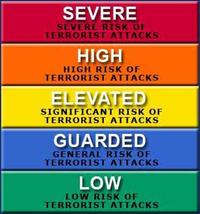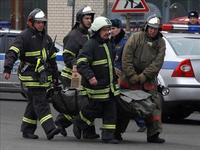-
Middle East upheavals complicate U.S. counterterrorism efforts

If the democratic surge in Egypt causes Islamist organizations such as the Muslim Brotherhood to join the government, the toughest counterterrorism challenge ahead may come as U.S. officials are forced to work with this new government, seeking common ground against terrorist enemies even if the Islamic faction tries to distance Egypt from its neighbor, Israel; American political leaders have long fused counterterror aims with support for Israel, but even those Arabs — let alone more religious Islamist organizations such as the Brotherhood — who oppose al Qaeda and jihadism, insist on the distinction between terrorism, on the one hand, and what they consider as a legitimate resistance to continued Israeli occupation of Palestinian lands; contending with an altered Arab world landscape with rising Islamic factions could thus force hard choices on the United States
-
-
Free program to detect suspicious vehicles unveiled
Funded by the Federal Emergency Management Agency (FEMA) and administered by the TSA, the First Observer program encourages parking lot operators to watch for oddities such as improperly parked cars, civilians conducting surveillance, and strange odors such as diesel from gasoline vehicles
-
-
The threat: The Muslim Brotherhood
The Muslim Brotherhood, established in Egypt in the 1920s, is described by one scholar as “the mothership for the jihadi ideologies and thinking—- therefore one can say today’s Al Qaeda, and today many other jihadists, are off shoots of the Muslim Brotherhood”; among the Brotherhood’s graduates: Al Qaeda’s number two leader, the Egyptian doctor Ayman al-Zawahiri who was imprisoned for three years on weapons charges following President Anwar Sadat’s assassination in 1981; Hamas, the terror network behind suicide bombings and rocket attacks in Israel; the Islamic Jihad Movement in Palestine, whose goal is the destruction of Israel
-
-
Western analysts, Israel: Egyptian regime will weather the storm
Israeli and western analysts agree Egyptian regime will remain as popular uprising gains strength while government clamps down on protesters; little to no concern of Muslim Brotherhood takeover: government shuts down Internet access, cellular service, and other personal communications in an effort to contain the rebellion as turmoil spreads across Egypt; journalists under assault; former IAEA chief El-Barradai under house arrest; ruling party headquarters set ablaze
-
-
U.S. ditching terror color warning system

By the end of April, terror threats to the United States will no longer be described in shades of green, blue, yellow, orange and red; the new plan for a terrorism alerts system calls for notifying specific audiences about specific threats; in some cases, it might be a one-page threat description sent to law enforcement officials describing the threat, what law enforcement needs to do about it, and what the federal government is doing, one of the officials said; the five-tiered color-coded terror warning system, created after the terrorist attacks of 9/11, was one of the Bush administration’s most visible anti-terrorism programs; the use of colors emerged from a desire to clarify the nonspecific threat information that intelligence officials were receiving after the 2001 attacks
-
-
U.K. changes terrorist surveillance procedures
U.K. home secretary announces changes in manner in which terrorist suspects may be detained and questioned; modifications are in response to claims of overreaction to 9/11 and the London bus bombings; critics claim changes not enough
-
-
New, interactive 2011 counterterrorism resource available
The national Counterterrorism Center has developed a multi-media Web site which offers useful information on terrorism; among other things, the site offers an an interactive map with information on specific terrorist activities and their relative geographical locations, as well as an interactive timeline that features wanted and captured terrorists, and other terrorism-related events
-
-
Moscow airport blast to force security rethinking

Experts say it is significant that those who masterminded the Moscow attack chose to bomb the arrivals hall of the airport — Moscow’s busiest — because it was an easier target than the heavily-policed departures area; one expert says: “Arrivals has always been thought of as the ‘soft’ area of an airport —- Nobody is flying anywhere, the baggage has all been screened, because it has been on planes already, and crucially, people are leaving the airport. It’s very rare that you ever saw somebody carrying a bag in to arrivals”; airports may begin screening people who come to meet friends and family at arrivals; “What will happen is that the barrier will get further and further back, so no longer is it just at departures, but at the airport door, or in some cases on the road as you drive up to the terminal,” says the expert
-
-
Khalid Sheikh Mohammed killed Daniel Pearl

U.S. officials used a forensic technique called vein analysis to corroborate the confession of Daniel Pearl’s self-professed killer, Khalid Sheikh Mohammed, who also is suspected of planning the 9/11 attacks on the United States; Mohammed was not part of the original plan to abduct Pearl; he told U.S. investigators that he was pulled in later by another senior al Qaeda operative; Mohammed was asked to take over because the kidnappers — midlevel and low-level Pakistani militants — did not know what to do with Pearl; Mohammed’s involvement presented al Qaeda with an opportunity for what it saw as a propaganda victory; a new report on Pearl’s assassination details problems in bringing to justice others suspected of involvement in the crime, including the recent release by Pakistan of a man thought to have been one of the main players
-
-
South Korean navy recaptures pirated tanker
South Korean special forces team boards a pirate-held tanker in the Arabian Sea; pirates were killed, injured or captured; 21 sailors rescued after being held since last Saturday; three rescuers sustain minor injuries
-
-
Hezbollah readies its forces for a Beirut coup

Unarmed, black-clad members of Iran-backed militant group fan out across Lebanon’s capital carrying hand-held radios, Lebanese media reports Hezbollah militants spread across the Lebanese capital of Beirut on Tuesday in a reportedly simulated coup of the capital, in the wake of the political unrest that has engulfed the country since the guerilla movement exited the Lebanese coalition and caused the government to collapse; Lebanon is facing its most severe political crisis in years, after Hezbollah ministers and their cabinet allies resigned from Prime Minister Saad Hariri’s government over disagreements about a United Nations-backed tribunal investigating the murder of his father; the tribunal has apparently indicted several Hezbollah members of involvement in the senior Hariri’s assassination
-
-
Australia, U.K. in global terrorism talks
Rising concerns about the emergence of new centers of global terrorism in Somalia and Yemen were a main focus of Monday’s talks between Australian and British foreign and defense ministers; those concerns were leading to increased intelligence co-operation between Britain and Australia; it is understood a new defense co-operation pact between the United Kingdom and Australia will be signed during the summit
-
-
Al Qaeda advocates theft, embezzlement to fund war
Followers of one of the fastest-growing radical Muslim terror groups are being told to steal, embezzle, and seize property -– especially from Americans — in order to finance their jihad; Muslim teaching generally forbids theft, but the new edition of Inspire magazine — launched by the group behind the air cargo printer bombs in October, the underwear bomb plot in December 2009 and the most recent pre-Christmas alert — is now telling followers that such crimes are justifiable, especially if the U.S. government and U.S. citizens are targets; intelligence analysts are also keying in on the magazine’s emphasis on the recruitment of women as suicide bombers; analysts also note that the leading articles in the latest edition of the magazine are all written by Americans.
-
-
New tactics in war on terror -- litigation
Islamic extremists are increasingly using lawsuits to threaten and intimidate civilians across the world; the Danish newspaper Politiken, which published the controversial Danish Mohammed cartoons in 2005, has been hit by a civil lawsuit; a Danish MP was recently forced to plead guilty to hate speech for speaking his mind about Islam; civilians can also use the courts to go after extremists using similar tactics
-
-
UN indicts Hezbollah chiefs in Hariri assassination
Prosecutor for international tribunal investigating assassination of former Prime Minister Hariri files indictment with pre-trial judge; Nasrallah threatens to “cut off the hands” of anyone attempting arrest of Hezbollah members; turmoil grows following last week’s collapse of government
-
More headlines
The long view
What Does Netflix’s Drama “Adolescence” Tell Us About Incels and the Manosphere?
While Netflix’s psychological crime drama ‘Adolescence’ is a work of fiction, its themes offer insight into the very real and troubling rise of the incel and manosphere culture online.
